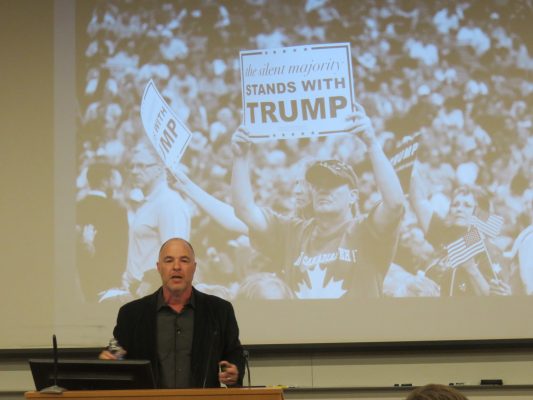Jackson Katz Discusses White Masculinity, Trump and the 2016 Election
October 20, 2016
For those following the presidential election, the most important issues may be immigration policies, tax records or trade agreements. Award-winning scholar-activist Jackson Katz, however, argues for the discussion of a different topic: white male identity politics.
Katz—an educator, author, filmmaker and cultural theorist—gave a presentation on masculinity and the presidency on Sept. 29 at Fordham Law, four days after the first debate between Hillary Clinton and Donald Trump.
Katz, however, has been interested in gender for quite a while before this election cycle. During his time in college, he discovered the “basic feminist idea” that “gender is one of the primary axes around which societies are organized.”
“I understood immediately—this is when I was like, 18 years old—that that has as many implications for men’s lives as it does for women’s lives,” he said. For him, gender needs to be seen as a category that does not equal women, but also includes men. This “linguistic invisibility” of men is how power functions, Katz argues.
As a result of Katz’s interest in gender, he began to speak out about men’s violence against women, something that he continues to do to this day. “I knew as a man that I was in a position to do something about it,” he said.
Since his college days, Katz co-founded Mentors in Violence Prevention (MVP), began the U.S. Military’s first worldwide gender violence prevention program, made two award-winning educational videos and gave a TED talk—“Violence against Women is a Men’s Issue”—that has been viewed over 2.5 million times. To top it all off, he has authored multiple books, the most recent one being “Man Enough? Donald Trump, Hillary Clinton, and the Politics of Presidential Masculinity.”
For Katz, gender politics is one of the key issues of presidential politics and is shown most prominently this year in the white male identity politics of Donald Trump.
“The only way for Trump to win the presidency is by getting something close to 70 percent of the white male vote, because he’s behind and has been and likely will continue to be very far behind among women and among people of color,” he said. “He has to make up the deficit by winning enormously among white men.”
Appealing to white male voters is not a campaign strategy unique to Donald Trump, however. According to Katz, white male identity politics has been a part of Republican presidential campaigns since Richard Nixon ran against George McGovern in 1972.
Katz said that in his campaign, Nixon appealed to white male voters by offering them cultural recognition and validation as patriotic Americans, rather than promising them policies such as better wages or working conditions. By using this strategy and framing McGovern as un-American, Nixon was able to win in a landslide victory, taking 49 states. Since then, the Republican Party’s appeal to white male voters has only increased.
Citing a ABC News/Washington Post poll, Katz said that Trump leads Hillary Clinton among white men without college degrees by 59 percentage points. This phenomenon is because appealing to white male voters is a central part of his campaign, Katz said, and was shown most prominently by Corey Lewandowski, Trump’s former campaign manager.
On Aug. 31, Trump gave a speech on immigration. When asked about it later, “Corey Lewandowski replied that the goal of that speech was to ‘lock in white men,’” Katz said. “In other words, the Trump campaign knows exactly what they’re doing in terms of appealing to white male voters and they know that that’s the key to winning the election.”
Katz predicted that this election will feature the highest gender gap in modern political history, where women will vote strongly against Trump and for Clinton and men will do the opposite. This gender gap, Katz noted, is most pronounced in the white vote.
To Katz, the idea that the Republican Party is the best vehicle for the aspirations of white males, especially those in the working class, is a “completely topsy-turvey understanding of the world.”
“Part of what frustrates me is that I totally disagree with that argument,” he said. “I think that the best interest of white men is voting for progressive candidates and liberal candidates who are going to support public education and support healthcare for working families and use the power of the federal government to invest in job creation. So what these millions of white men are doing is voting against what I consider their own interests.”
Ultimately for Katz, the Republican Party’s and Trump’s appeal to white male voters boils down to the candidate’s slogan.
“The ‘Make America Great Again’ slogan for Donald Trump, I think you could really translate that as saying ‘Put White Men Back on Centerstage Again,’” Katz said. “Because I think a big part of Donald Trump’s appeal is visceral and emotional to a lot of white men who feel like they’ve been left behind, they’ve been sort of neglected, and because there’s been so much focus on the women and people of color and all of these other sort of emerging groups. And so Donald Trump represents their attempt to make a strong statement that ‘We’re here and we matter and we were important to this country, we still are important to this country.’”













